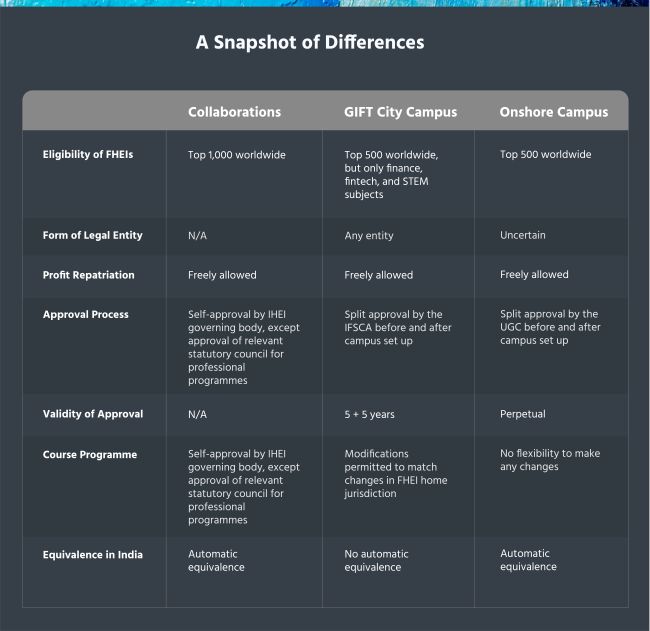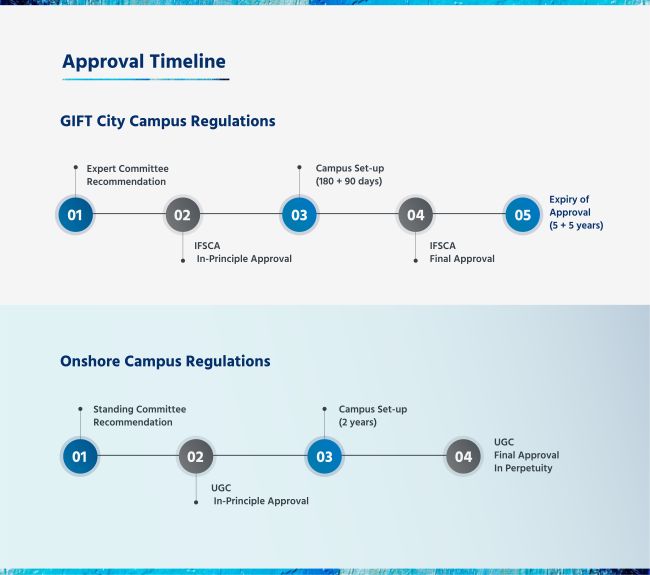- within Consumer Protection topic(s)
- in United States
- within International Law and Energy and Natural Resources topic(s)
- with readers working within the Technology and Law Firm industries
An analysis of the Onshore Campus Regulations and GIFT City Campus Regulations that govern the setup of India campuses by foreign educational institutions
Summary
- There are broadly three options available for foreign higher
education institutions (FHEIs) to establish their presence in the
Indian education market:
- Collaborations with Indian higher education institutions (IHEIs)
- Establishing a campus in mainland India
- Establishing a campus in GIFT City
- The Collaboration Regulations, which cover collaborations of FHEIs with IHEIs, have demonstrated notable success, with over 400 FHEIs currently engaged with IHEIs.
- Both the Onshore Campus Regulations and GIFT City Campus Regulations govern setup of FHEI campuses – the former in the mainland and the latter in GIFT City.
- The differences between the three available options encompass university eligibility, course programme eligibility and flexibility, legal structure, profit repatriation, approval processes and timeline, and course equivalence.
- Globally, the trend is for top-ranking universities to first collaborate with local universities in foreign countries before deciding on establishing their own international campuses.
- Between the options of setting up international campuses in the mainland and in GIFT City, we expect FHEIs to prefer setting up campuses in GIFT City, given the operational flexibility and profit repatriability benefits under the GIFT City Campus Regulations and the tax and other benefits offered to entities in GIFT City.
- The recent regulations may have significant positive impact on mitigating brain drain, improving domestic university standards, and enhancing workforce quality, contingent on the economy's capacity to absorb increased graduate supply.
FHEI Participation in Higher Education: A Comparison of Onshore Campus Regulations and GIFT City Campus Regulations

FHEIs in India's Education Landscape: History & New Developments
In keeping with the National Education Policy of 2020 and the recent push for internationalisation of education in India, the University Grants Commission (UGC) published regulations for set up and operation of campuses of foreign higher educational institutions (FHEIs) in India (Onshore Campus Regulations) in early November 2023. These regulations were finalised after incorporating suggestions from various Indian and foreign universities, including top-tier universities like Oxford, on a draft version of the regulations published earlier in the year.
The Onshore Campus Regulations come in the wake of corresponding regulations (GIFT City Campus Regulations) put forth in October 2022 by the International Financial Services Centres Authority (IFSCA) for the establishment of branch campuses of FHEIs in GIFT City (India's first international financial services hub) and the UGC regulations that govern collaborations between Indian and foreign higher educational institutions, which were notified in May 2022 (Collaboration Regulations). The collaboration route has been a significant success, with over 400 foreign universities currently in tie-ups with Indian universities.
While there are significant differences between the regulations governing FHEI campuses to be set up in GIFT City and the mainland, as detailed in this article, both are viable options for FHEIs transitioning from collaborations with Indian partners to setting up campuses in India. However, both routes present potential hurdles that could impede this transition to campuses within GIFT City or in the mainland.
University and Course Eligibility
The UGC adopts a light touch under the Collaboration Regulations, which permit the Top 1,000 FHEIs worldwide to offer twinning, joint degree, and dual degree programs in collaboration with Indian Higher Educational Institutions (IHEIs). By contrast, both the Onshore Campus Regulations and the GIFT City Campus Regulations permit only the Top 500 FHEIs in the world to set up campuses in the mainland and in GIFT City, respectively. Moreover, the permissible subject areas under the GIFT City Campus Regulations are limited to financial management, fintech, and STEM courses.
Caveats and Considerations
The Top 500 cut-off might prove to be too restrictive in attracting more FHEIs to India. News reports suggest that only two universities – University of Wollongong and Deakin University, both Australian and ranked 162 and 233 respectively in the QS World University rankings – have expressed an interest thus far in establishing campuses in GIFT City. Depending on the interest going forward, the UGC and IFSCA may need to consider expanding the pool of eligible FHEIs.
The courses offered are also an important contributing factor to the success of these initiatives. While the focus on finance and STEM subjects in the GIFT City Campus Regulations is understandable, the blanket exclusion of all other subjects is limiting and at odds with the global trend to offer students a combination of STEM and liberal arts courses.
Legal Structure and Profit Repatriation
The GIFT City Campus Regulations also expressly allow repatriation of profits without any restriction. Given this express provision, FHEIs seeking to set up campuses in GIFT City would have the flexibility to establish themselves either as for-profit entities (i.e., limited companies or limited liability partnerships) or as not-for-profit entities (i.e., trusts, societies, or Section 8 companies), all of which are entitled to the various direct and indirect tax exemptions available to GIFT City entities. See our separate article on India's GIFT Story.
The Onshore Campus Regulations, on the other hand, provide for repatriation as per Indian foreign exchange rules. Under those regulations, education being a service sector activity is, technically, not subject to any repatriation restrictions. As for the form of the entity, the regulations permit FHEIs to enter into joint ventures with IHEIs and Indian companies. The FAQs issued by the UGC go a step further in allowing FHEIs to establish new companies to set up campuses in India. However, it is unclear whether any such entity can be a profit-making enterprise.
Caveats and Considerations
Unlike collaborations – where there is no capital deployed – the form of the legal entity and the ability for FHEIs to repatriate profits is critical for wholly owned and joint venture operations.
In K-12 schooling, the rule requiring the legal entity to be a non-profit enterprise has been a long-standing impediment for PE funds and school chains. This rule has forced school owners to employ a two-tiered structure involving a trust, society, or Section 8 company housing the school and one or more profit-making companies supplying management, curriculum development, logistics, and other services to the school.
The GIFT City Campus Regulations mark a welcome departure in this regard by expressly allowing repatriation of profits without any restriction. However, under the Onshore Campus Regulations, the absence of an express provision permitting onshore campuses to be profit-making entities poses significant uncertainty for FHEIs. It is worth noting that domestic universities are invariably set up as not-for-profit entities; in a 2022 judgement involving a private medical college, the Supreme Court had ruled that educational institutions cannot earn a profit. The Onshore Campus Regulations also refer to the FHEIs' fee structure having to be 'transparent and reasonable,' which alludes to restrictions on profit-making for these campuses.
It is still unclear if FHEIs seeking to set up campuses in the mainland will be allowed to make and repatriate profits or if they will need to resort to workarounds such as the two-tiered structure adopted by school chains and even certain domestic universities operating in India.
Approval Process
Not surprisingly, collaborations between IHEIs and FHEIs are subject to a self-approval regime under the Collaboration Regulations. In the normal course, an IHEI requires the approval of only its own governing body before entering into a collaboration with an FHEI. For professional programmes governed by a statutory council such as All India Council for Technical Education, the IHEI also needs to seek the relevant council's approval.
The Onshore Campus Regulations and the GIFT City Campus Regulations adopt broadly similar approaches to the approval process. Both sets of regulations involve an initial recommendation by an expert body (a UGC standing committee for the mainland and a committee of experts for GIFT City), an in-principle approval by the UGC/IFSCA, followed by the set-up of the campus and then the final approval by the UGC/IFSCA.
Caveats and Considerations
The split-approval mechanism, while consistent with the corresponding process for most domestic schools and universities, raises the risk of an FHEI expending significant resources in setting up the campus, only to experience delays or potential failure in obtaining final approval.
Unlike in financial services businesses where such two-step approvals are common and the regulator is mainly focused on funding and other financial conditions, the final approval for a university campus would depend on the UGC/IFSCA being satisfied with respect to facilities, infrastructure, human resources, and other such matters. We hope the UGC/IFSCA can mitigate this risk for FHEIs by ensuring that the conditions for in-principle approval are as objective as possible.
Approval Timeline

Though the approval process under the Onshore Campus Regulations and the GIFT City Campus Regulations is similar, the approval timeframes are vastly different. While the Onshore Campus Regulations provide applicants with a two-year window following the in-principle approval to set up the campus, the GIFT City Campus Regulations provide only a six-month set-up period, further extendable by only three months and only at the discretion of the IFSCA. In the same vein, while the UGC's final approval is granted in perpetuity, the corresponding IFSCA approval is valid only for five years, with the renewal term also limited to a five-year period.
Caveats and Considerations
These limitations under the GIFT City Campus Regulations seem unduly restrictive and not in sync with IFSCA's broader goal of providing a more enabling framework for overseas investors. It is instructive that the UGC's draft regulations for FHEIs setting up campuses in the mainland originally had a similar 10-year approval term that was removed in the final version. IFSCA should ideally follow UGC's lead and provide for a longer set-up period and a one-time perpetual approval to attract more FHEIs to GIFT City.
Course Programme Approval and Flexibility
While collaborations in technical, medical, legal, agricultural, and similar professional programmes require the approval of the respective statutory councils, all other twinning, joint degree, and dual degree programmes that meet the specified criteria can be approved by the governing body of the IHEI offering the course.
In contrast, the Onshore Campus Regulations require every new course programme to be approved by the UGC and offer no flexibility to the FHEI to make modifications to the original curriculum approved by the UGC. However, in the GIFT City Campus Regulations, the IFSCA provides flexibility to FHEIs to make modifications to the approved course curriculum to match the changes in the course offered in their respective home jurisdictions.
Caveats and Considerations
The Collaboration Regulations offer maximum flexibility given that course programme approval lies with the IHEI itself. Between the Onshore Campus Regulations and GIFT City Campus Regulations, the latter offers greater flexibility to the FHEI related to course programme modifications, though both regulations require course programme approval by external bodies.
Recognition/Equivalence in India
In collaborations between IHEIs and FHEIs, the involvement of the IHEI ensures that any degree awarded under the Collaboration Regulations stands on the same footing as a corresponding degree awarded by the IHEI itself, without having to go through any equivalence measures in India.
The Onshore Campus Regulations and the GIFT City Campus Regulations again adopt divergent paths in the recognition granted to degrees conferred by FHEIs. The degree awarded by an FHEI under the Onshore Campus Regulations is considered to be equivalent to the corresponding degree awarded by an IHEI for all purposes, without any further need to seek equivalence from any Indian authority. Unfortunately under the GIFT City Campus Regulations, there is no mention of the recognition of the degree in India.
Caveats and Considerations
While there are bespoke arrangements such as the MOUs between India and the UK, Australia, and France on mutual recognition of academic qualifications, these arrangements are more the exception than the norm. An express provision for degree equivalence under both the Collaboration Regulations and Onshore Campus Regulations is a welcome measure that could prove to be a key incentive for Indian students, who must otherwise resort to equivalence and conversion measures after securing an overseas degree from a foreign university.
In the absence of an express equivalence provision, Indian students with degrees granted by an FHEI in GIFT City will have the additional burden of fulfilling the equivalence or conversion measures prescribed by the relevant authority in India. While the UGC has recently introduced draft regulations to standardise the process and timeframe for grant of equivalence to foreign degrees, those regulations expressly carve out disciplines like medicine, pharmacy, nursing, law, and architecture that are regulated by separate statutory councils in India.
The Touchstone Take
The Cross-Border Education Research Team (CBERT) database indicates that China, UAE, Singapore, Malaysia, and Qatar lead the way in 'importing' international campuses of FHEIs. The experience of these countries suggests that it is rare for top-ranking global universities to set up international campuses. As already witnessed in India, top-tier universities are more likely to initially seek collaborations with their local counterparts. The success of these collaborations could prompt FHEIs to consider broadening such relationships and set up joint ventures with equity participation, rather than setting up campuses of their own.
Both with a joint venture or as a wholly owned entity, FHEIs are likely to want maximum operational flexibility (especially related to course curriculum and fee structure) as well as profit repatriability. Given the more favourable position on these matters for campuses in GIFT City as well as the tax and other benefits offered by the IFSCA, we expect FHEIs ready to set up India campuses to prefer GIFT City over the option of setting up campuses in mainland India. However, the IFSCA would do well to remove the fixed-term for approvals for FHEI campuses in GIFT City and ensure that the degrees granted by such campuses enjoy automatic equivalence in India.
To the extent that India is successful in attracting FHEIs to set up campuses in GIFT City and the mainland, it would mitigate the longstanding 'brain drain' problem. The entry of FHEIs into India can also have a positive knock-on effect on the standard of domestic universities, resulting in an increase in overall quality and employability of the Indian workforce. If the economy can keep pace with the increased supply of graduates, it will turn out to be a 'win-win' proposition for all concerned and the new regulations will have successfully served their purpose.
The content of this article is intended to provide a general guide to the subject matter. Specialist advice should be sought about your specific circumstances.




